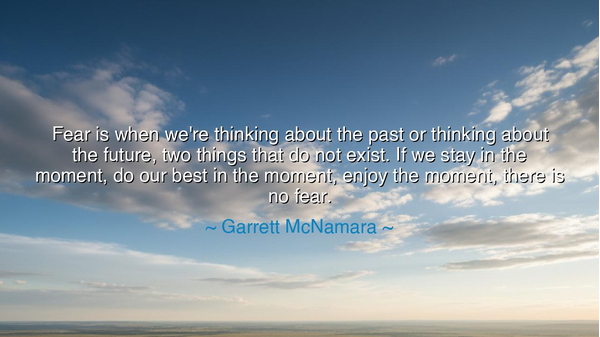
Fear is when we're thinking about the past or thinking about the
Fear is when we're thinking about the past or thinking about the future, two things that do not exist. If we stay in the moment, do our best in the moment, enjoy the moment, there is no fear.






"Fear is when we're thinking about the past or thinking about the future, two things that do not exist. If we stay in the moment, do our best in the moment, enjoy the moment, there is no fear." These words, spoken by Garrett McNamara, hold a profound truth about the nature of fear and the power of presence. Fear, McNamara suggests, is born not from what is happening right now, but from what has already happened or what might happen in the future. The past is behind us, and the future is unknown, yet we often allow these phantom realms to dominate our thoughts and actions, creating anxiety and fear in the present. By focusing on the present moment—by embracing the now—we free ourselves from the weight of what was and what might be, finding peace and clarity in doing our best in the moment.
The ancients understood the power of the present moment in ways that still resonate today. Buddha taught that suffering comes from attachment—to the past and to the future. The Stoics, too, emphasized the importance of focusing on what we can control in the present, urging individuals to live with equanimity and not be disturbed by things outside their control. Marcus Aurelius, in his Meditations, reflects on the transient nature of time, urging us to live fully in the present, for that is the only moment we truly possess. His wisdom echoes McNamara’s message: the past and future are illusions that, if we allow them to dominate, create unnecessary fear and prevent us from living with purpose and clarity.
Consider the story of Hercules, the mighty hero of Greek mythology, whose labors were meant to redeem him and protect his people. In his journey, he faced immense challenges and enemies, yet it was often his ability to focus on the present task—whether facing the Nemean Lion or cleaning the Augean stables—that led to his success. Hercules did not waste time brooding over past failures or fearing the future. He focused solely on the task at hand, fully immersing himself in the challenge before him. In this way, he embodied the timeless wisdom of staying present, reminding us that fear arises when we allow ourselves to be distracted by the echoes of the past or the shadows of the future.
McNamara’s insight can also be found in the story of Leonardo da Vinci, whose genius was often rooted in his ability to remain present in his work. Whether sketching anatomical studies, designing his many inventions, or painting the Mona Lisa, da Vinci’s creativity thrived when he was fully immersed in the moment, applying his genius to the task before him. In moments of uncertainty, his focus on doing his best in the moment allowed him to transcend the pressures of time and expectation. Da Vinci’s work is a testament to the idea that fear is often rooted in future outcomes and external pressures, but by staying grounded in the present, we can create our finest work.
When we reflect on McNamara’s words, we recognize that fear often arises from uncertainty—uncertainty about what we did in the past or what might happen in the future. The ancient warriors knew this well, particularly the samurai of Japan, who lived with honor and discipline in the moment. Their courage did not come from thinking about their legacy or fearing their demise. Rather, it came from devotion to their craft, living in the moment, and knowing that true mastery and bravery arose from focus and commitment to the task at hand. The samurai’s approach to life was one of single-mindedness, where each moment was lived with intensity and awareness.
The lesson McNamara teaches us is not just one of awareness but of action. Fear is often the result of inaction—when we dwell on what has passed or what is yet to come. But if we focus on the present, doing our best in the moment, we can move through life with a clarity and resolve that allows us to confront challenges without being overwhelmed by fear. By taking action, by embracing what is, we regain control of our own journey.
In our own lives, this means embracing the present moment, acknowledging that the past is gone and the future is uncertain. Instead of worrying about what might have been or what might be, we must focus on what we can do now, in the here and now. Whether we face challenges at work, in relationships, or in personal goals, fear can only take hold when we lose sight of the present and allow ourselves to become consumed by what is beyond our control. So, let us follow McNamara’s wisdom and live fully in the moment, doing our best and finding peace in the act of living authentically and fully. The future will unfold as it may, but the power to shape it lies in the choices we make today.






AAdministratorAdministrator
Welcome, honored guests. Please leave a comment, we will respond soon